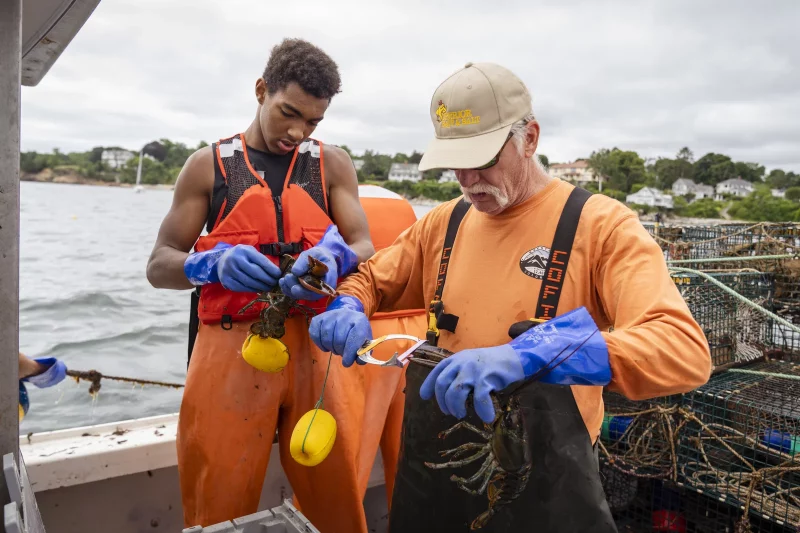These young men catch more than lobsters. They also catch a break
Share
Explore Our Galleries
Breaking News!
Today's news and culture by Black and other reporters in the Black and mainstream media.
Ways to Support ABHM?
By Fred Bever, NPR

Maine is one of the least diverse states in the nation, and the fishermen in its famed lobster industry reflect that demographic reality. But this summer, a small group of Black young men started to learn the trade.
At 15, Cristiano Silva thought he might spend the summer working at a McDonald’s near his home on the outskirts of Portland, Maine, and help with household expenses.
Instead, he found himself on a lobster boat called the Sea Smoke, out among Casco Bay’s rocky islands. One breezy day on the boat last month, Cris scrunched his nose and placed a fist-size mesh bait bag full of smelly herring inside a wire lobster trap.
“I like it, I like it. The only thing I can’t stand is the smell of the fish,” he says. “I’m not going to lie. That’s what’s kind of kicked my butt. I can’t handle it right now.”
Cris was born in the Democratic Republic of Congo, and he was still a toddler when his mother emigrated here a decade ago. This spring he and three other Black teens were recruited from area high schools to learn how to lobster in a new program called “Lift All Boats.”
Guided by experienced volunteers, the young men started from scratch. They spent their first day painting foam buoys in distinctive bright colors, tying them to traps and then heading out into the bay and dropping them to the seafloor.
Every week after, they went back out to haul up the traps to see what they caught.
Find out how this program works.
Youth like these young men are also finding work with tech firms.
ABHM’s breaking news includes other relevant stories.









Comments Are Welcome
Note: We moderate submissions in order to create a space for meaningful dialogue, a space where museum visitors – adults and youth –– can exchange informed, thoughtful, and relevant comments that add value to our exhibits.
Racial slurs, personal attacks, obscenity, profanity, and SHOUTING do not meet the above standard. Such comments are posted in the exhibit Hateful Speech. Commercial promotions, impersonations, and incoherent comments likewise fail to meet our goals, so will not be posted. Submissions longer than 120 words will be shortened.
See our full Comments Policy here.